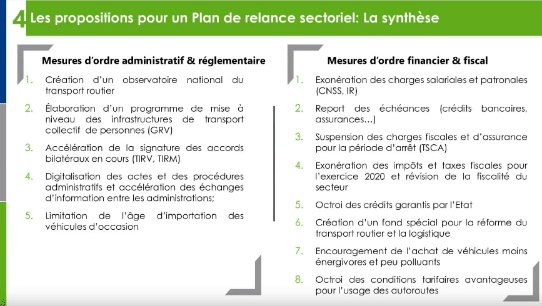
The Covid-19 crisis is impacting the functioning of our mobility and transport as never before. It has recalled the importance of the mobility of people and goods for our economy and society, but also the structural weaknesses of the sector – in Morocco and in the world.
That’s why the Moroccan Ministry of Equipment, Transport, Logistics and Water (METLE) and the Sustainable Mobility Platform (PMD) organised a public-private dialogue on the impacts, responses and opportunities for post-Covid freight and passenger transport in Morocco on 22 July 2020, with the support of the project “Advancing climate strategies in rapidly motorising countries (TraCS)” to discuss the current situation of the sector based on numbers, share international examples of Covid-19 response and identify opportunities to strengthen the efficiency and resilience of the sector.

The dialogue was based on the results of a sector survey, launched by the Ministry and the PMD on the theme “Road Transport and Covid-19”. The survey is drawing a picture of the situation in Morocco during the pandemic and the sector’s recovery propositions.
Download the results here and watch the stream of the event here (in French).
So how is the sector effected? What opportunities and challenges does it face? And what chances lay within recovery measures?
The transport sector is one of the most critical and affected sectors in the Moroccan economy during the COVID-19 crisis due to its important contribution to the development of the country.
Indeed, in Morocco, the transport sector
During the lockdown period, the companies in the sector, all modes combined, experienced drastic drops in their turnover, some of them as a result the stop of activity.
“The crisis came in suddenly. Business vacillated between days when we received orders and days when there was no demand. Other companies, for their part, found themselves in a total halt of activity“, explains Hicham Mellakh, President of the CGEM’s Logistics and Energy Competitiveness Commission.
The road transport sector has been heavily impacted, threatening the loss of several hundred jobs and accelerating the bankruptcy of many already fragile informal companies. Recently, with the resumption of activities, the coach capacity was quickly increased. But the demand has not yet increase sufficiently, mainly due to the change of customer behaviour- people fear to move around in public transport- and city level restrictions imposed by the authorities (number of passengers, suspension of lines etc).
The sector therefore needs to recover as quickly as possible. But how can its recovery be turned into an opportunity to strengthen the resilience of the sector and to provide it with greater efficiency, equity and better environmental impact?
Hicham Mellakh believes that
“companies will increase their prices because the sanitary equipment (daily disinfection of vehicles, installation of plexiglass protections, gels, masks, gloves…) has generated great expenses“.

But this crisis has not only had bad repercussions. Some companies have taken advantage of it to develop:
“This crisis has enabled us to improve digitalisation. We are moving towards “zero paper”. The customer no longer needs the ticket. After buying a ticket online, he receives a QR Code that allows him to travel“, says Elghazouani Jnini, the CTM company’s deputy general manager.
The Moroccan ministry is working in the same sense. At the level of bus stations, the sale of bus tickets in digital format is a project carried out by the Ministry of the Interior, whereas the METLE is working to digitalise transport documents and road control operations through information systems to control activity and competition in the field of transport.
As far as climate change is concerned, opinions are still divided, because although companies are thinking about the sustainability of their activity, their priority remains on safeguarding jobs and surviving the crisis.
As Morocco is determined to develop its activity in a clean and sustainable way through the use of green energies, the country should invest in new energies for transport according to Mr Nourredine Dib.
“Making transport greener is necessary, we should find the equation now without affecting the purchasing power of the transport user“, demands Mr. Nourredine Dib.
The logical continuation of Morocco’s government investment in clean energy is to think about alternative solutions for sustainable transport. The grant projects launched by the METLE will be continued as part of the COVID-19 recovery and optimised in a sustainable approach such as the fleet Renewal and Scrapping Programme and the future bonus-malus policy which is currently under study.
Thereby, data from the sector are essential. The METLE is preparing for a national transport observatory to obtain the data and statistics needed to steer and monitor the sector for a cleaner recovery.

The results of the survey provide a basis for formulating responses and preparing measures for recovery.
Other measures were recommended like
These measures will enable to respond to the issues raised by the health crisis, such as supporting the informal sector to formalise, taking advantage of regionalisation to plan for more sustainable mobility and strengthening the resilience of the sector by developing multimodality, digitalisation and reduction of energy consumption.
